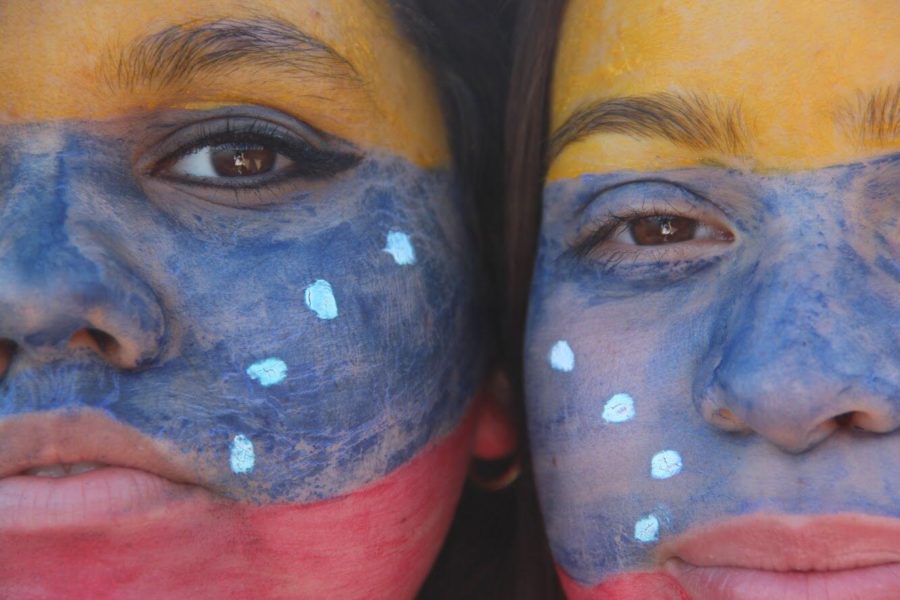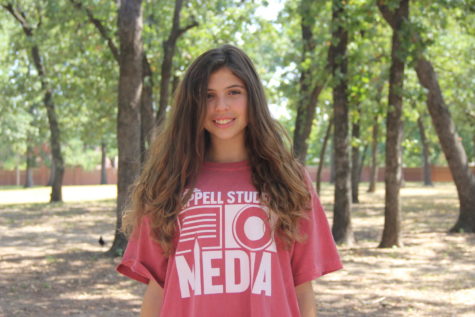Miles from home, but close to their hearts
Hard times in Venezuela impacting CHS students
Coppell High School senior Isabella Mejia and junior Laura German tell their story about how the current Venezuelan political problems affect their people. Mejia and German were both born in Venezuela and recently moved to the United States.
October 17, 2017
Last year, Coppell High School senior Isabella Mejia left Venezuela and her closest friends and family members in search for bigger opportunities.
Mejia’s stepfather was unable to acquire a passport to leave with Mejia and her mother.
“My stepfather lives there,” Mejia said. “He’s like my closest family member. He’s having troubles finding food because it’s really expensive and whenever he tries to get some he can’t find it at the store.”
Unable to constantly communicate with her husband has been hard on Mejia’s mother, Kitys Gil.
“I feel anguished because I don’t know if they eat, if they have medicine, or even if they are still alive,” Gil said. “I’m anguished.”
Venezuela is located in South America with desirable resources such as oil, diamonds, gold and iron with opportunity for economic growth. However, right now Venezuela is going through hard times, including lack of freedom, opportunity and health care is creating discontent among the country.
“It’s really hard to see people who don’t have food, medicine or a place to live,” Mejia said.
Millions of Venezuelans are leaving the country, forcing them to be apart from their family members that have not found their way out of the country. Many are unable to leave due to of the lack of materials used to print passports.
Although some Venezuelans that have been able to escape the conflict and are attempting to help those left behind, the Venezuelan government has made it more difficult to provide assistance.
“Before we used to send boxes with food and medicine but now that changed and we can’t anymore and it’s frustrating,” Mejia said. “Now we don’t know what to do to help them have a better life.”
Not being able to provide resources to loved ones anymore has added to the frustration of not being able to help.
“I feel with my hands tied because we don’t have any other way to help Venezuela, we can’t send food [or] money.” Gil said
Studies show about 9.6 million Venezuelans are eating two or fewer daily meals which causes illness among people. Most Venezuelans live in poverty around Caracas. the capital city, and street children are often the most affected by violence.
Venezuelans are victims of an authoritarian government under the leadership of Hugo Chavez.
The corruption in the country is higher than ever and poverty is still a big issue. Because of this abuse of power and people’s discontent, anti-government protests have resulted in at least 70 deaths and more than 4,000 arrests so far, according to local human rights groups.
Many Venezuelans even feel guilty, since leaving others behind makes them feel powerless against the current government.
“It feels awful to have people that are suffering all those consequences while you are in a better situation,” said CHS junior Laura German, who left Venezuela when she was 9. “I’m living in a good place with a lot of benefits being unable to help people in my country.”
Though these problems give Venezuela an unfavorable reputation, this does not define the country itself. Also called “Paradise on Earth” Venezuela is a country full of natural beauty. Venezuela rests under an eternal tropical climate, with a great variety of landscape and wildlife.
But beyond that living legacy given by nature, the Venezuelan nation has an architectural, cultural and industrial heritage that is not found elsewhere on the planet.
History could be the best source of knowledge about how to resolve these issues. With a unique culture, landscape, and heritage, Venezuela has the resources to provide a rich environment for citizens and tourists alike.
“We are going to be the adults of the future,” German said. “We need to be aware of what’s going on, so we can help when we grow up.”
Leaving their hometown, their friends, and family has affected Venezuelans from all around the world and there will always be a part of them left behind.
“Even though we live in Coppell now and we are 2,676 miles away from Venezuela, our hearts are still there,” Gil said.










